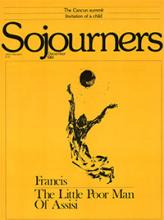He rejoiced in all the works of the hands of the Lord and saw behind things pleasant to behold their life-giving reason and cause. In beautiful things he saw Beauty itself; all things were to him good....
He embraced all things with a rapture of unheard of devotion, speaking to them of the Lord and admonishing them to praise him. He spared lights, lamps, and candles, not wishing to extinguish them as a symbol of Eternal Light. He walked reverently upon stones, because of him who was called the Rock....
He forbade the brothers to cut down the whole tree when they cut wood, so that it might have hope of sprouting again. He commanded the gardener to leave the border around the garden undug, so that in their proper times the greenness of the grass and the beauty of flowers might announce the beauty of the Father of all things....
He called all animals by the name brother, though among all the kinds of animals he preferred the gentle.
(Thomas of Celano, Second Life)
Francis of Assisi was slight in figure with that sort of slightness which, combined with so much vivacity, gives the impression of smallness. He was probably taller than he looked; middle-sized, his biographers say; he was certainly very active and, considering what he went through, must have been tolerably tough. He was of the brownish Southern coloring, with a dark beard thin and pointed such as appears in pictures under the hoods of elves; and his eyes glowed with the fire that fretted him night and day.
Read the Full Article

